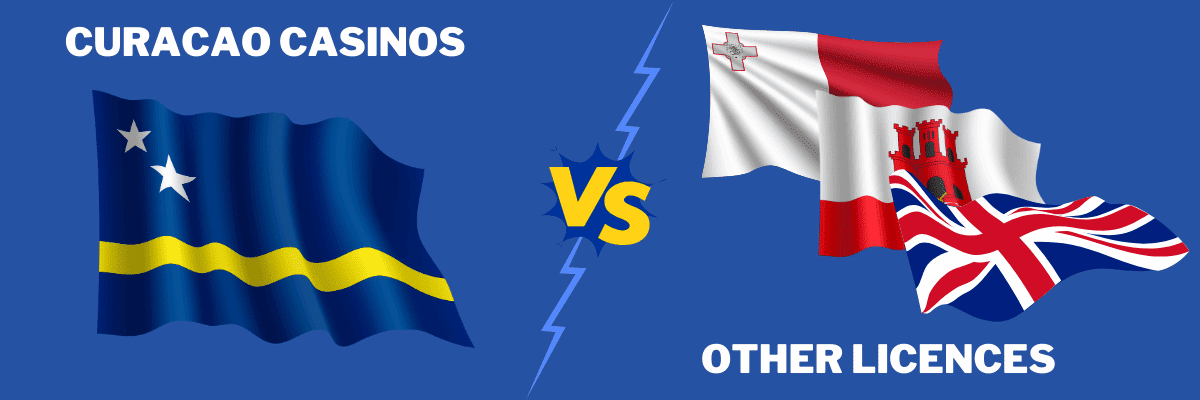Gambling licenses play a crucial role in the online gaming industry, ensuring operators follow legal requirements and maintain player trust. Two widely recognized jurisdictions for licensing are Curaçao and the United Kingdom (UK). While both licenses allow businesses to operate legally, they differ significantly in cost, regulatory standards, market access, and player protection. This article compares the two, providing insight for operators and players alike.
Curaçao Gambling Licenses
Curaçao is one of the oldest gambling jurisdictions, offering licenses since 1996. It is widely known for its affordability and straightforward application process, making it a popular choice for startups and small operators.
Advantages of Curaçao Licenses
- Low Costs:
Curaçao licenses are significantly cheaper than many other jurisdictions. Initial licensing fees and ongoing costs are minimal, making it accessible for new operators with limited budgets. - Ease of Application:
The licensing process in Curaçao is streamlined, with relatively few bureaucratic hurdles. Operators can often secure a license in a matter of weeks. - Single License Coverage:
A Curaçao license covers all forms of online gambling, including casino games, sports betting, and poker. This reduces complexity for operators who offer multiple gambling products. - Global Accessibility:
Curaçao-licensed operators can accept players from many countries, particularly in unregulated or loosely regulated markets, such as parts of Asia, Latin America, and Africa.
Disadvantages of Curaçao Licenses
- Weak Player Protections:
Curaçao has a reputation for weak oversight regarding player disputes. Players often have limited recourse if issues arise with a licensed operator. - Lax Regulation:
Operators with Curaçao licenses face minimal regulatory scrutiny. This has led to concerns about fairness and responsible gambling measures on some platforms. - Market Restrictions:
Curaçao licenses are not recognized in highly regulated markets like the UK, USA, or many European Union (EU) countries. Operators with these licenses may struggle to build credibility in such regions.
UK Gambling Licenses
The UK Gambling Commission (UKGC) is one of the most respected regulators in the gambling industry. Established under the Gambling Act 2005, it enforces strict standards to protect players and ensure fair play.
Advantages of UK Licenses
- High Credibility:
A license from the UKGC signals reliability and trustworthiness. Operators with UK licenses are seen as reputable and player-focused. - Strict Player Protections:
The UKGC requires operators to implement robust measures for responsible gambling. This includes tools for deposit limits, self-exclusion, and time-out periods, ensuring player safety. - Access to a Regulated Market:
A UK license allows operators to legally target the UK, one of the largest online gambling markets in the world. The UK gambling sector is highly lucrative, with millions of active players. - Clear Dispute Resolution:
The UKGC mandates fair treatment of players, requiring operators to provide effective dispute resolution through approved third-party services like IBAS (Independent Betting Adjudication Service). - Fair Gaming Standards:
UKGC-licensed operators must use certified Random Number Generators (RNGs) and undergo regular audits to ensure fair gameplay and transparency.
Disadvantages of UK Licenses
- High Costs:
Obtaining a UK license is expensive. Operators face high application fees, annual license fees, and compliance costs. This can be a significant barrier for small operators. - Complex Application Process:
The UK licensing process is detailed and time-consuming. Operators must meet stringent requirements, including proof of financial stability, business plans, and technical audits. - Strict Oversight:
While the strict regulation benefits players, it increases the administrative burden on operators. Compliance failures can result in hefty fines or license revocation.
Key Differences Between Curaçao and UK Gambling Licenses
| Aspect | Curaçao License | UK License |
|---|---|---|
| Cost | Low | High |
| Application Process | Simple and quick | Complex and time-consuming |
| Player Protection | Minimal | Strong |
| Market Access | Broad but excludes regulated markets | Limited but includes UK market |
| Regulatory Oversight | Lax | Strict |
| Credibility | Moderate | High |
Which License is Right for Operators?
The choice between a Curaçao and UK gambling license depends on the operator’s goals and resources.
- Curaçao License:
Ideal for startups and small operators entering unregulated markets. Its affordability and simplicity make it an attractive option for businesses testing the waters of online gambling. However, operators must be prepared for challenges in gaining player trust and accessing regulated markets. - UK License:
Best suited for established operators targeting mature, regulated markets like the UK. While costly and demanding, a UK license provides credibility, strong player protections, and access to a lucrative customer base.
Conclusion
Curaçao and UK gambling licenses cater to different needs within the gambling industry. Curaçao’s affordability and flexibility make it appealing for new operators, while the UK’s stringent standards ensure player trust and access to a well-regulated market. Operators must weigh the pros and cons of each jurisdiction to determine which aligns with their business model and long-term goals. For players, understanding the differences can help make informed decisions about which platforms to trust.
